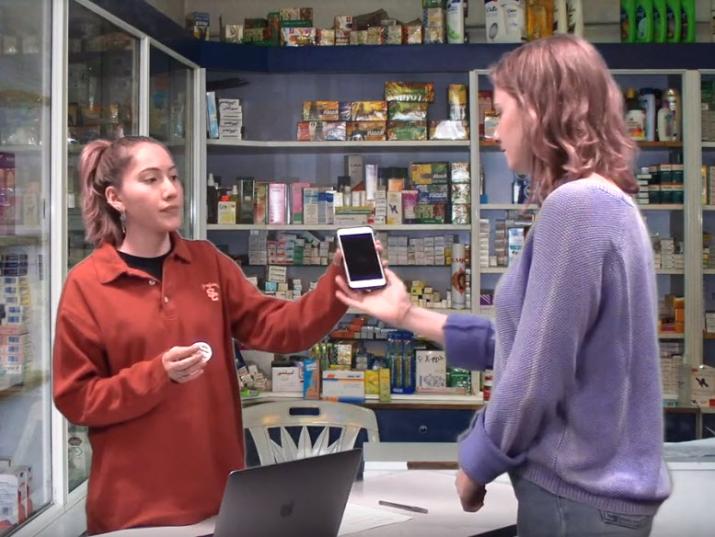
In one of the videos, students demonstrate how to request translation services at a pharmacy. From left: Melissa Gerdts and Madison Alvarado.
Published November 25, 2018, last updated on December 11, 2018 under Education News
As a native Spanish speaker, Melany Puente knows firsthand the frustrations of navigating a culture that doesn’t speak your language. Every conversation can become an exasperating dance to find common ground.
But when those cross-cultural conversations are about healthcare—such as when non-English speakers seek help for medical problems or attempt to file an insurance claim—misunderstandings can be more than just frustrating.
“Information such as where to buy a medication, how many times to use it and how long one should take it can get lost,” says Puente, a senior majoring in global health and international comparative studies.
This fall, Puente is taking part in a service-learning project that is trying to bridge the language gap for a particularly vulnerable population: refugee families living in Durham. As part of a class called “Issues in Global Displacement,” students produced a series of videos to acclimate newly resettled refugees to situations they may find linguistically or culturally challenging, such as filling a prescription or talking to a child’s teacher.
Dubbed DukeHELLO, or Help for English Language Learners Online, the videos will be shown at 5 p.m. on Nov. 29 in the Sociology-Psychology Building, Room 127. Students recorded the videos in English and translated them into French. They also plan to offer versions in Swahili.
The project is part of a unique class that sits at the intersection of language and global health. Taught by Deborah Reisinger, an assistant professor of the practice of Romance studies and an affiliate of the Duke Global Health Institute, the course is conducted in French. Through a partnership with Church World Service (CWS), a local resettlement agency, students are paired with French-speaking refugee families to identify ways to help new residents manage the challenges of resettlement. In past semesters, students have offered digital literacy training, developed a bilingual guidebook to Durham and curated a museum exhibit on resettlement journeys.
“Our course focuses on the critical role of language and culture in refugee resettlement,” says Reisinger. “Too often, we design interventions without considering how language might impede access to resources, or how cultural practices might affect an individual’s choices. By learning to listen, and by taming our tendency to create quick fixes, we can better understand such large challenges and ultimately create lasting, fruitful interventions.”
Through their interactions with refugee families, students learned that many situations they consider routine are far more difficult for people with limited experience with American systems and culture. Buying medications, shopping in a supersized grocery and even riding public transit are often confusing and intimidating for refugees, and knowing little or no English only heightens feelings of alienation.
“The class has changed my views to see how nuanced language barriers can be,” says Nefer Batsuli, a junior. “I hadn’t considered how some situations we often consider as common sense would become ten times harder with a language barrier.”
In the videos, students act out several of those scenarios, including shopping for groceries and visiting a pharmacy. The simulations work in details many newcomers may not know, such as the fact that pharmacies must offer a translator if customers request one.
Several of the scenarios involve managing healthcare, which Reisinger says is a particular challenge for newly resettled refugees. Last year, Reisinger helped lead a Bass Connections project that studied the barriers refugee families face in accessing health services, which noted the need for more services to orient them to the complexities of American healthcare. Reisinger says the videos will provide case workers and volunteers with another tool they can use to aid families’ adjustment.
But the videos won’t be the only lasting impact from the class. Batsuli and Puente say their interactions with refugee families has had a profound effect, giving them deeper appreciation for both the joys and pains of assimilating to a new culture.
“We can sit in a class for three hours each week and learn about the issues displaced people face through readings, news articles or discussions among ourselves,” Batsuli says. “But we cannot truly understand the needs of others until we sit down with them, lay aside our accumulated knowledge and assumptions, and just listen to their stories.”
“Becoming self-sufficient within months of arriving to a foreign country isn’t easy,” adds Puente. “It can be a frustrating process, but we have also seen so much strength and joy in the face of these challenges.


